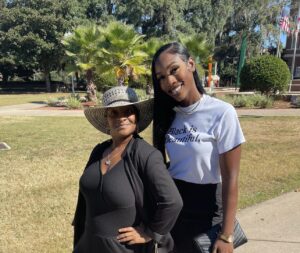
Photo Courtesy of Sydney Dorsey-Rencher
On Oct. 22, Nike released the “FAMU” Dunk Low sneakers. One of four collaborations with prominent HBCUs including Tennessee State University, Clark Atlanta University, North Carolina Agricultural and Technical State University, and Florida Agricultural and Mechanical University.
The FAMU Dunk Low was created by FAMU alumna Caitlyn K. Davis who received her Bachelors in Biology. During her time on the hill, Davis was very active on campus, running for Miss FAMU, being a member of National Council of Negro Women (NCNW), and also being an entrepreneur selling her HBCU Made and BAE (Black And Educated) apparel.
Davis touched on the resell culture that exists today and the resale value of her shoes. “As the #1 Public HBCU for the last 4 years we’ve set the standard too many times, I can understand why someone would value the shoes because it matches our uniqueness, I’ve seen pairs go up to $800. I believe the price is gonna continue to rise because it’s one of a kind.”
The FAMU Dunks are a huge impact on the HBCU landscape because with only four HBCUs receiving a collaboration it makes the shoes more coveted and finally gives HBCU the notice in which they’ve been wanting for some time.
With more students applying and enrolling into HBCUs it gives more of a spotlight on these institutions which can overall make them more profitable and increase their likeness which can overall build their consumer rate for brands to expand their marketability.
But when you speak to consumers you must also touch on the supplier as well. Yes a lot of shoes were manufactured by Nike but they are not always sold by a Nike store or affiliate such as Foot Locker, Finish Line and others. Reselling culture has become a spiking trend in today’s society to capitalize on individuals who want these products, with the emergence of apps such as GOAT, Stockx, and WhatNot. These apps were made to resell items at a higher rate to benefit the supplier and make a profit while up-charging the consumer who really wants the item.
“I think most specifically for the HBCU consumer we’ve been hungry to be apart of these products and releases for so long, that it becomes a point of contention when students and alumni can’t get their hands on the product they believe is special to them, but this is a reality that all consumers deal with. I do believe Nike is positioned well to further the relationships they’ve built with HBCUs, and this consumer and community should remain optimistic about what’s to come,” said FAMU alumni Jacquelyn Rivers.
The FAMU Dunk Low along with the other HBCU colorways are a prime example that Nike is not only listening to us but they are responsive. For the HBCU consumer this is amazing that our voices are heard, but at what cost if they are not affordable to the ones that either go to the institution or have graduated from it due to reselling.
A week before Nike’s release date local Tallahassee store A.P.B Store released the pairs to the public where there were people wrapped around the block in hopes of getting the shoes, people were lined up hours before the store even opened. With today’s sneaker culture you don’t know if people want the shoes to wear or to sell but unfortunately in this economy consumers are going to have to buy from resellers if they are not fortunate enough to get their hands on the products.